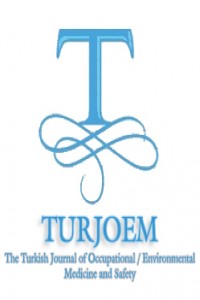ASSESSMENT OF OXIDATIVE STRESS IN ARSENIC EXPOSED WORKERS – THIOL DISULFIDE HOMEOSTASIS AND LIPID PEROXIDATION
Abstract
Arsenic (As) is
an environmental toxicant. Human are exposed to As from a variety of sources
including drinking water, food, ambient air, burning of wood treated with As
containing preservatives, pesticides and occupational exposure. As exposure in
human is associated with a number of adverse health effects including cancer
and oxidative stress (OS) is suggested as one of the major underlying mechanism
of As toxicity. In the present study we aimed to assess thiol disulfide
homeostasis, via a novel technique, and lipid peroxidation that was quantified by isoprostane
levels to determine oxidative status in occupationally As exposed
workers.
The study group
included 71 male As exposed workers who admitted to our clinic for periodic
medical examination and the control group was composed of 43 healthy male
administrative workers. Thiol disulfide parameters were determined with a novel
spectrophotometric method described previously by Erel and Neşelioğlu. Urine As levels and 8-isoprostane
levels of workers were also
determined.
The median urinary
As levels and isoprostane levels of study group were significantly higher than
control group (p<0.001). The mean disulfide level, disulfide/native thiol
ratio and disulfide/ total disulfide ratio were also significantly higher in
study group (p<0.001). A positive correlation was determined between the
urinary Ar levels and isoprostane level (p<0.001, r= 0.394), disulfide level (p<0.001, r=0.568).
As result our
results indicate that As induced OS, confirmed by the shift in dynamic thiol
disulfide homeostasis and lipid peroxidation, in occupationally exposed
workers.
References
- Department of Pharmacology, Occupational Diseases Hospital, Ankara, Turkey
- Department of Biochemistry, YıldırımBeyazıt University, Ankara, Turkey
- Gölbaşı Hasvak Government Hospital, Turkey
- Department of Family Medicine, Occupational Diseases Hospital, Ankara, Turkey
- Council of Forensic Medicine, Ankara, Turkey
- Department of Toxicology, Occupational Diseases Hospital, Ankara, Turkey
Abstract
References
- Department of Pharmacology, Occupational Diseases Hospital, Ankara, Turkey
- Department of Biochemistry, YıldırımBeyazıt University, Ankara, Turkey
- Gölbaşı Hasvak Government Hospital, Turkey
- Department of Family Medicine, Occupational Diseases Hospital, Ankara, Turkey
- Council of Forensic Medicine, Ankara, Turkey
- Department of Toxicology, Occupational Diseases Hospital, Ankara, Turkey
Details
| Journal Section | Articles |
|---|---|
| Authors | |
| Publication Date | February 16, 2017 |
| Published in Issue | Year 2017 Volume: Volume 2 Issue: İssue 1 (1) - 2.İnternational Congress Of Forensic Toxicology |


